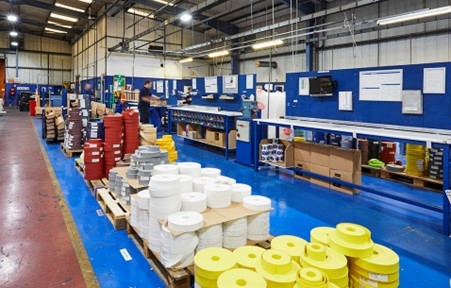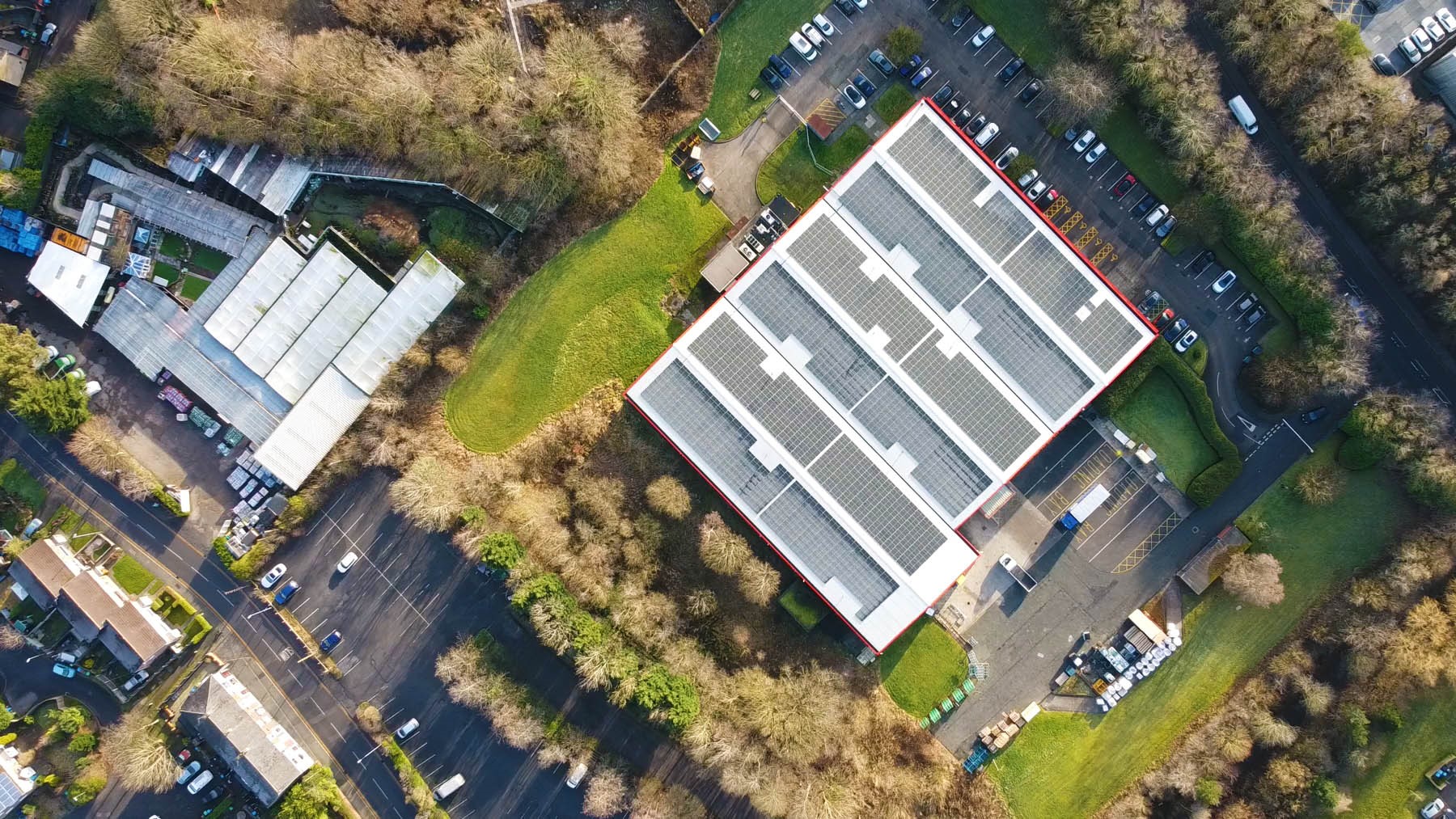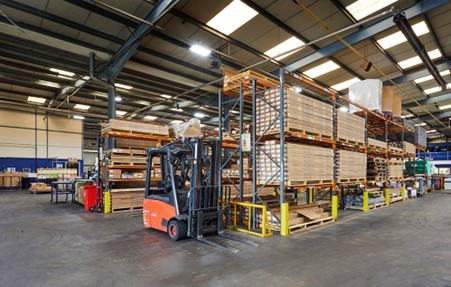
Installing solar a 'no brainer' for building product extrusion firm
Read time: 5 minutes
Carbon reduction
Financial savings
Based in Oldham, Greater Manchester, QPSL produces polyvinyl chloride (PVC) and aluminium products for the construction industry, including flooring, insulated building products, window and door components, and bespoke extruded PVC solutions.
As a manufacturer, QPSL has long been aware of its impact on the planet and has maintained a comprehensive environmental management system (certified to the ISO 14001 standard) since 2013.
The business has also been working with specialist sustainability advisors since 2012 to improve energy efficiency, minimise waste and reduce carbon emissions.
The wide variety of measures taken to reduce energy consumption over the past decade range from upgraded compressors and chillers to LED lighting and improved process controls. As a result, the amount of power required to process one tonne of QPSL’s PVC product reduced by 15 per cent between 2013 and 2021.
The next improvement on the to-do list for 2022 was a refurbished roof and solar PV array to generate clean electricity on-site, providing protection from rapidly rising energy costs in the process.
QPSL engaged the services of Green Economy member Perfect Sense Energy (PSE) to design and install a 558kW solar system after visiting a fellow manufacturer nearby that had also worked with PSE to add solar to its roof. “Increased energy costs have started to hit us badly,” says Product Manager, Dr. Diane Luther. “We first looked into installing solar in 2018, but at the time it was a payback of about 6 years. It’s a no-brainer now.”
“QPSL’s solar panels will pay for themselves in 3-4 years – generating an estimated 495,000kWh of clean power in year one. That equates to an energy saving of around £146,000 and carbon savings of around 118 tonnes.
“This may sound like a big installation – it’s 1,469 panels, covering nearly 2,500m2 of roof space – but given the massive growth in the solar industry it’s now around the average size of system we’re installing.”
The measures implemented so far have already had a significant impact on carbon reduction, with emissions from energy and transport in 2021 nearly half of what they were in 2017.
Part of QPSL’s success is down to its lean manufacturing ethos. “We look at it as an ongoing process of continuous improvement,” Diane points out. “Whenever there is an upgrade in machinery or a good commercial reason to do something, we look at the additional environmental benefit we can achieve at the same time.
“A good example is our chillers. They were originally located inside, sucking in all the hot air from the extrusion machines in the factory. When it was time to upgrade and replace one of the chillers, we made the decision at the same time to move them all outside, which has reduced energy load significantly.”
Explaining further, Diane says: “It’s not just about trying to replace what you already have, but actually taking the time to step back, do some process mapping and think, can I change this process in a way that gives me more benefit overall? Can I change the way the machine is being used? Is there additional waste that can be avoided, not only in material or energy, but other inefficiencies such as time, re-work, and so on. There are always things you can test and experiment, and that’s part of the whole lean philosophy.”


QPSL's factory site
During 2022, QPSL took steps to formalise its carbon reduction objectives and reporting process, having benefitted the Low Carbon Skills: Journey to Net Zero programme which is fully-funded for residents based in Greater Manchester.
Although the business already had a head-start due to its successful environmental management system, JTNZ helped to widen the scope of its reporting and accumulate everything into one ‘carbon tracking’ file.
“Journey to Net Zero was good because it explained what activities you have to track, under which scope of emissions, and what is actually relevant to your business,” Diane comments.
Attending the online workshops with a range of other businesses was also a valuable experience, Diane adds: “Hearing from other manufacturers who have similar struggles is obviously useful. But even hearing from people from very different situations was insightful – a small office in Manchester city centre has to take a very different approach to net zero than us, for example. It was really good to get that broad spectrum and understand how net zero affects businesses differently.”


Solar Panel installation on the QPSL site
Source: Perfect Sense Energy
QPSL has now created a formal carbon reduction roadmap that breaks down its net zero ambitions, with measurable targets for 2025 through to 2050. Planned actions include moving to lower carbon logistics, switching to 100 per cent renewable energy, engaging with employees and sourcing more sustainably, such as prioritising suppliers that have a clear net zero statement.
The roadmap is already helping with stakeholder engagement and responding to customer requests, Diane explains: “We have an external paper that we can provide to stakeholders, and an internal paper with assigned responsibilities, so we can be held accountable if we don’t reach those goals.
“In the last year some of our larger customers have started asking questions like whether we have a sustainability statement and what plans we have in place for carbon reduction. We already had all the answers they were looking for, which is a nice confirmation that we are doing all the right things.”
If you are looking to install Solar PV or other low carbon technologies in your home or place of work, you can find your perfect project partner and learn more about the process through our online searchable Marketplace.
Moving forward, efforts to reduce waste and material use are high on the agenda. When indirect ‘Scope 3’ emissions from the value chain are included in the calculations, raw material and waste recycling account for the vast majority of QPSL’s total carbon footprint. By 2035, the business aims to have reduced disposed process waste to zero and cut general waste generation in half.
One example of an improvement in the pipeline is a plan to reduce process waste through new grinding equipment. Currently, much of the PVC waste created during the manufacturing process is ground back up and fed back into the system. However, the existing grinders are unable to grind down very large lumps of material and these pieces have to be collected by another company. QPSL plans to purchase a more energy efficient grinder capable of dealing with larger lumps of PVC and automatically feeding it back into the process. This will not only reduce waste and energy consumption but also time spent moving the material – a triple win.
“Seeing our Scope 3 impact for the first time was definitely a big moment,” Diane recalls. “Some of it we cannot do anything about at the moment, either because the solutions are not financially feasible or because we are dependent on wider changes, like the amount of recycled material available on the market. But there are still things we can influence.
“Another good example is travel. Since the pandemic we have replaced most in-person meetings with online ones. Previously, we were holding three or four in-person meetings a year with sales representatives who operate all across the UK and Ireland, but now we take a hybrid approach so people come in person just once or twice. There are lots of other meetings where we have stopped travelling altogether.”


More photos from QPSL's Oldham site